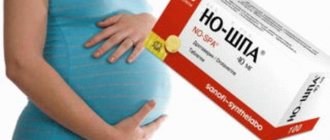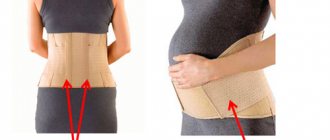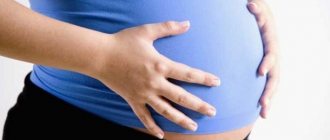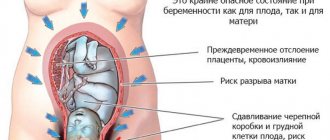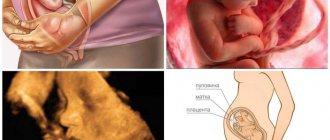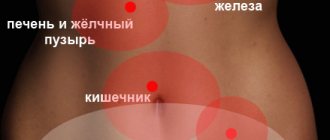Why does my stomach hurt at 34 weeks of pregnancy?
Eight and a half months ago the child's development began.
This period suggests the possibility of early labor. Although the baby is not fully formed, the percentage of nursing when reaching the end of the third trimester is close to 100 percent. For medical reasons, labor is induced artificially. The woman experiences severe physiological pain. The training contractions begin. Over time they will become stronger. Until the uterus descends, it puts pressure on all surrounding organs.
Signs of such pressure:
- Frequent urge to urinate.
- Disorders of the gastrointestinal tract (heartburn, constipation, diarrhea).
- Regular shortness of breath even at rest.
The pregnant woman is sensitive to any movement of the fetus. His weight is already significant. With a cephalic presentation, the legs rest against the mother's ribs. The child is quite active, the abdominal wall and ribs will hurt. Normally, 4-5 movements per hour are recorded.
At this time, you need to follow the recommendations received from your doctor for the prevention of pain, the development of pathologies and dangerous conditions. It is recommended to take walks in the fresh air and perform light exercise.
However, it is important not to overwork yourself. If there is overexertion, you can feel that your stomach has begun to harden. Rest is required to stop this feeling.
You need to continue to monitor your diet. Do not allow yourself prohibited foods and soda. During the period of preparation for childbirth, disturbances in the digestive system will be felt by acute pain.
Sometimes painful discomfort is a symptom of a pathological condition.
The presence of additional signs will help determine this:
- the presence of an inflammatory process - increased body temperature;
- infections - there is a change in the consistency, smell and color of mucous discharge.
High-intensity pain accompanied by fever, signs of intoxication, impaired consciousness, and vomiting indicates the development of inflammation of the appendix. Emergency surgical intervention and organ amputation are required.
Bleeding or leakage of amniotic fluid occurs - conditions may develop in which there is a risk of death of the child:
- Premature birth.
- Placental abruption.
- Frozen pregnancy.
There are signs - call an ambulance. Do not wait for an appointment at the antenatal clinic. Do not try to get to the hospital on your own. When entering a medical facility, the diagnosis will be established after a blood test and ultrasound examination (ultrasound). Treatment will be selected.
Fetal development
The baby continues to develop rapidly and gain weight. This week his height can reach 45 cm, and his body weight can reach 2 kg. If a woman is expecting twins, then each child will weigh less than normal.
At this time, the baby acquires its own unique facial features. The original fluff gradually disappears, and along with it the original lubricant disappears. The hair on the head continues to grow, and the more active this process is, the thicker the baby’s hair will be at birth. The child’s skin becomes pinkish, wrinkles are smoothed out, and subcutaneous fat is gained. Its content is about 8% of the total body weight. Every day the baby becomes cuter and cuter.
In the womb, a baby can suck its thumb for a long time. In this way, it improves the sucking reflex and prepares the facial muscles for the upcoming feeding process. While performing sucking movements, the baby swallows amniotic fluid. They, passing through the body, prepare its digestive organs for the upcoming work. At the same time, kidney function improves. Every day they return about 500 ml of clear urine to the amniotic fluid.
At 34 weeks, the baby assumes the body position in which he will be born. Normally, he should lie head down and buttocks up. Sometimes the child lies down radically differently. At 34 weeks, you can still try to change the baby's position. To do this, doctors perform special manipulations, the need for which is decided on an individual basis.
The bones of the child's skull remain soft and mobile. This is possible due to the fontanelles, which will gradually close when the baby is born. Nature itself provides such a structure of the newborn’s skull in order to ensure the easiest passage through the birth canal.
Other bones gradually harden, cartilage tissue thickens, and nails continue to grow. All this requires a lot of calcium, which the fetus will take from the mother's body. Therefore, a woman needs to take care of a sufficient intake of all vitamins and microelements from food.
In the third trimester of pregnancy, the baby's heart and blood vessels develop very actively. His heart rate is currently twice that of an adult. If a mother knows what position her baby is in, she can use a stethoscope to listen to his heart rhythm on her own.
The fetal nervous system continues to improve. At this time, periods of sleep and wakefulness are established, which largely depends on the mother.
Inside the abdomen, the baby is able to distinguish sounds and respond to light. In bright light, he closes his eyes.
At 34 weeks, the baby already has a functioning endocrine system that produces growth hormone. The work of the thyroid and pancreas, and the adrenal cortex is also honed.
Interestingly, the baby can already distinguish taste, since the papillae on his tongue are well formed by the 34th week.
Thanks to the developed hearing system, the baby is already able to respond to sounds. Therefore, a woman needs to listen to pleasant music, sing lullabies to her child and read fairy tales aloud. It’s good to just talk to your baby in an even and calm voice.
What songs will soothe the pain
From the moment hormonal changes begin, a woman will be ruled by emotions. Music is a natural stimulant of mental energy. She can lift your spirits. Improve the emotional background. Energize.
When choosing a repertoire, preferences must be taken into account. A girl may like pop music, bard songs, rap, she should play them. You shouldn't give up minor ballads if they give you pleasure.
When listening, a woman will be able to escape from everyday life. Due to the improvement in morale, the pain will become noticeably less.
What does dull, pulling, point or cutting pain in the abdomen indicate?
Stomach pain during pregnancy is due to changes in the body, in organs associated with hormonal changes, changes in the position of internal organs, and obstetric pathologies.
Many types of these sensations do not pose a threat to the health of the mother or the condition of the fetus. Others cause significant harm and even death to the woman and the unborn child.
Pain is a reaction of the nervous system to stimuli. A symptom of many diseases, including obstetric pathologies during pregnancy. A pregnant woman experiences hormonal changes and a restructuring of many systems. They are also accompanied by this feeling.
If discomfort and pain occur, it is better to consult with your doctor about the nature of these sensations and appropriate treatment. During pregnancy, a woman is responsible not only for her own health, but also for the health of the baby.
Nature has determined that the mother’s body tries to protect the fetus from all negative influences. A plug formed from mucus in the cervix prevents pathogenic microorganisms from entering.
Umbilical cord nutrition is formed in such a way that harmful chemical compounds do not enter the fetus. The uterus itself protects the child from external mechanical influence.
At the same time, during the period of bearing a baby, the woman herself may regularly experience pain of varying intensity and nature. Each type of discomfort indicates the presence of different pathological conditions, with the exception of harmless obstetric ones associated with changes in the maternal body and preparation for childbirth.
Based on the nature, intensity of pain, and gestational age, we can talk about how dangerous the condition is.
For example, pulling, extending to the lower back and groin, may indicate a risk of miscarriage. An additional sign of the condition will be the presence of bloody discharge.
In this case, you should immediately seek medical help and undergo an examination. If you delay visiting a doctor, the frequency of contractions will become more frequent and spontaneous miscarriage will occur.
Uterine tone is dangerous regardless of how early it was diagnosed. The fetus may experience a lack of oxygen and incoming nutrients. The woman feels a sharp pain like contractions. The solid state of the uterus and lower abdomen is recorded.
In case of injury, late toxicosis, or stress, placental abruption may occur. The condition is accompanied by acute pain in the lower abdomen. Often there is internal bleeding without external manifestations in the form of discharge. Urgent hospitalization and surgical intervention are required. Without help, death will occur.
Cramps accompanied by dizziness at five to twelve weeks can be a symptom of an ectopic pregnancy. For a number of reasons, the egg was unable to enter the uterus and became embedded in the fallopian tube.
As a result of the rapid growth rate of the fertilized egg, severe pain occurs. The woman is sent for an ultrasound examination. An operation to terminate the pregnancy is prescribed. Lack of medical care will result in death for the pregnant woman.
A number of non-gynecological problems also contribute to the occurrence of unpleasant sensations in the lower abdomen:
- Disruption of the gastrointestinal tract. Additional symptoms: bitterness in the mouth, tingling in the lower abdomen, heartburn.
- Inflammation of the bladder and urinary tract. Symptoms: discomfort and burning when urinating, increased frequency of the urge to urinate, increased body temperature.
- Seasonal colds. They are accompanied by headaches, nasopharyngeal congestion, aching bones, and fever.
- Inflammation of the appendix (appendicitis). An acute condition in which severe vomiting occurs, weakness, and a strong increase in temperature are detected. Surgery is used to remove the inflamed area. This procedure is safe for a pregnant woman. Abdominal laparotomy appendectomy is used if peritonitis is suspected and less invasive laparoscopy is used if there are no signs of peritonitis. A course of rehabilitation therapy is prescribed.
It is possible to diagnose the pathology based on additional symptoms. Treatment should be supervised by medical professionals. It is prohibited to take pharmaceutical drugs on your own. If you aggravate your own condition through inept actions, this will inevitably affect the child’s development.
Surveys
If a woman did not undergo a third ultrasound screening last week, now is the time to do so. An ultrasound is performed at 33 weeks of pregnancy to assess the development of the baby and the readiness of the female body for childbirth. During the examination, the doctor will evaluate:
- the baby’s main parameters are his height, length of limbs, girth of the tummy and head;
- the degree of development of its internal organs;
- will determine the position of the baby in the uterus, pay attention to whether there is entanglement in the umbilical cord (this factor can complicate the course of childbirth).
In addition, the doctor will evaluate the condition of the placenta and cervix and calculate such an important indicator as the amniotic fluid index. The normal ultrasound at the 33rd week of pregnancy is a placenta in the first degree of maturity, because the time of birth has not yet come and it is important that during the remaining period of gestation the baby receives adequate nutrition.
When do you need to see a doctor urgently, and which doctor will help?
Cases of pain where medical intervention cannot be avoided:
- Cramping attacks of a pulling nature (especially in the first trimester of pregnancy) - you need to immediately seek help. There is a high risk of miscarriage or placental abruption. The presence of mucous discharge mixed with blood is a reason to call an ambulance for immediate hospitalization of the patient.
- Shingles with a return to the lower back in the presence of a burning sensation at the time of urination - signs of the development of pyelonephritis. Long-term treatment may be required. Signs of illness should be reported immediately.
- In the later stages, accompanied by contractions and increased uterine tone - a sign of premature birth.
Regardless of the stage of pregnancy, the appearance of bleeding from the vagina with or without pain - you should definitely call an ambulance.
Consulting a pregnant woman and caring for the patient during pregnancy is the responsibility of the local obstetrician-gynecologist. They work in district antenatal clinics.
You can get an appointment with them in the following ways:
- through an electronic appointment system;
- by calling the registration number of the medical institution;
- Some consultations retained the journal recording system.
If the pain is not associated with the course of pregnancy and does not affect the development of the fetus, then you need to contact your local physician. It is important that treatment is selected taking into account saving the life and health of the mother and child.
Sex
As for intimate life, it is allowed, provided that there are no medical restrictions. In this case, sex should be performed as carefully as possible so as not to disturb the child. To do this, you need to avoid sudden movements and avoid poses that place pressure on your stomach.
If a woman has any doubts about the possibility of having sexual intercourse, she should definitely consult a doctor. If pain or other unusual sensations occur during intimacy, you should stop it immediately.
If a woman does not have a regular sexual partner, then she should understand that now the child is especially susceptible to various infections. Therefore, any sexual contacts must be protected.
Found an error in the text? Select it and a few more words, press Ctrl + Enter
Top medications to reduce abdominal pain during pregnancy and breastfeeding, painkillers
Painkillers are not advisable during pregnancy. Especially in the first months, when the main formation of organs and tissues of the future person occurs. However, the process of experiencing discomfort caused by constant negative factors also does not bode well.
Before purchasing analgesics, consultation with a specialist is required. It is advisable to try non-pharmaceutical ways to cope with discomfort.
The least dangerous drug is Paracetamol. Suitable for use throughout the entire gestation period. Toxic components are in minimal concentration and are quickly excreted in the urine.
Ibuprofen is a non-steroidal anti-inflammatory drug. Prescribed with caution during the second trimester. Contraindicated for the first and third trimester. Use may cause a number of dangerous side effects. If your condition changes slightly for the worse while taking an analgesic, you should inform your doctor.
Indomethacin also belongs to the group of non-steroidal anti-inflammatory drugs. It is subject to the same restrictions as Ibuprofen. If taken continuously, there is a risk of damage to the child's kidney function.
For the first two trimesters, it is permissible to use creams and ointments based on:
- Diclofenac.
- Ketoprofen.
- Ketorolac.
In the third trimester, you can only use local products based on herbal ingredients. It is forbidden to apply them if they contain bee or snake venom.
Ointments with an irritating effect that stimulate increased blood circulation can also have a negative effect. There is a risk of developing uterine tone and high blood pressure.
The most powerful painkillers are classified as narcotic substances and are prohibited for free sale. Their use occurs only in a hospital with extremely severe pain. These are drugs based on morphine and codeine.
The list of chemical compounds for pharmaceutical use during pregnancy is extremely limited. Before you start taking it, you should read the instructions for use in detail and strictly follow the manufacturer’s recommendations on dosage and method of use.
It is important to familiarize yourself with the provisions on common side effects and contraindications.
It is possible to use folk and non-traditional methods of getting rid of suffering. For example, yoga for pregnant women, acupuncture, light massage, aromatherapy. Traditional methods are also used. But their use also needs to be discussed with a specialist.
Preventive measures to avoid abdominal pain
The basis of prevention is the correct lifestyle of a pregnant woman:
- No stress factors. The mental state of the mother is the key to the health of the child. The fetus inside a woman reacts sensitively to changes in the mother’s emotional background. He is not able to recognize the causes of depression or fears, but he is aware that adverse events are occurring. If the mother is very worried, there is a risk of pathological changes during the formation of the future person. Neurological and psychological problems are possible.
- Elimination of physical fatigue. Pregnant women are not recommended to attend training regularly. During active sports, blood pressure levels increase noticeably. This will provoke the development of uterine tone, which will inevitably lead to adverse consequences. You can go for walks in the fresh air.
- Properly designed diet and nutrition schedule. It must be balanced. You should not consume fast food products or preservatives; it is recommended to reduce the amount of tea and coffee. It should consist of vegetables, fruits, animal and plant protein. It is worth taking vitamins prescribed by a doctor for those who are pregnant. Weight control is required, since the percentage of subcutaneous fat outside the normal range negatively affects the functioning of the cardiovascular system and gastrointestinal tract. The feeding processes of the fetus are disrupted. With rapid weight gain, nutritional correction and a special diet may be prescribed. Excess weight contributes to decreased activity, bad mood, and additional pain in the back and joints. Make sure there is no overeating.
- Maintaining a sleep and rest schedule ensures that a woman is highly active. She does not feel tired and overwhelmed, which means she has a positive morale.
- Regular observation by an obstetrician-gynecologist according to the established schedule, passing mandatory tests, compliance with received medical recommendations. Undergoing developmental ultrasound examinations and other diagnostic measures.
- Tracking the development of chronic pathologies that were diagnosed before pregnancy.
- Prompt treatment of colds, bacterial and viral diseases acquired during pregnancy.
- Eliminate all bad habits, such as alcohol, smoking, and drug use. Failure to comply with this rule results in a developmental delay in the baby.
- Monitoring blood pressure for hypertension (high blood pressure) or hypotension (low blood pressure). Monitor your sugar levels if you are diagnosed with diabetes.
- Do not take a hot bath or shower, or a contrast shower. A sharp change in ambient temperature threatens a rise in pressure and disruption of the cardiovascular system.
Compliance with these rules will ensure comfortable and proper pregnancy. The pain will be considered obstetrically safe. But even if you follow all the recommendations, you need to carefully monitor your own condition and, if there are reasons, seek medical help.
What does sudden abdominal pain mean?
The suddenness of the development of pain is a sign of an acute form of pathology. If the sensation is localized on the right side, accompanied by nausea, vomiting, dizziness, there is a risk of developing inflammation of the appendix.
Immediate hospitalization and surgical intervention are required before perforation begins. Removing appendicitis is a common procedure for surgeons. It passes without complications.
During pregnancy, the operation is performed in compliance with all required patient safety criteria.
Non-obstetric types of pathological pain of a sudden acute nature include:
- intestinal obstruction;
- peritonitis.
As with appendicitis, acute pain accompanied by vomiting and general weakness. The syndrome extends to the lower abdomen, lower back, sacrum, and groin.
Unilateral, accompanied by bleeding from the vagina - a sign of ectopic pregnancy.
Additional signs of a dangerous condition:
- cramping character;
- increased symptoms in a horizontal position of the body;
- severe vomiting;
- shortness of breath at rest;
- frequent heartbeat, which in frequency goes above 100 beats per minute.
In the absence of medical attention, the fallopian tube ruptures. Internal bleeding begins.
Causes of physiological pain
At 34 weeks, the baby's weight is not much different from what it will be at birth. All systems and organs have already been formed. The baby has already turned over with his head towards the birth canal. The child is already quite big, and it is difficult to carry him.
Intense pain in the lower abdomen at 34 weeks of pregnancy can manifest itself as a result of physiological processes, such as:
- stretching of the ligamentous apparatus that supports the uterus;
- displacement of abdominal organs;
- slowing of intestinal and stomach motility due to the relaxing effect of the hormone progesterone on smooth muscles.
In addition, a child may touch an organ during movement, which will cause severe, sharp pain that will gradually subside. A woman is able to feel so-called training contractions. They do not yet cause abdominal pain at 34 weeks of pregnancy; rather, they simply cause inconvenience.
They are described as pulling and gradually sinking downwards. They usually arise due to an uncomfortable body position, emotional stress, physical activity, or a full bladder. A sensation appears due to tension in the uterus; at 34 weeks they are considered normal.
Since the load on the spine increases greatly, pregnant women notice pain in the back and lower back. If they are physiological in nature, then a bandage or therapeutic exercises will help eliminate them. Due to the fact that the uterus compresses the organs of the digestive tract, as well as intestinal atony, disturbances in digestive function may be observed.
Often pregnant women experience diarrhea or constipation, heartburn, nausea
